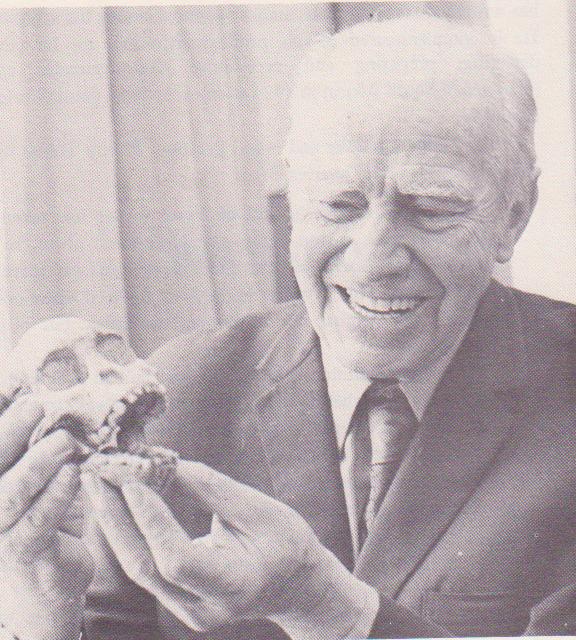
Raymond Arthur Dart (1893-1988) was an Australian-born South African anatomist and anthropologist. He graduated in medicine at Sydney in 1917 and became Professor of Anatomy at Witwatersrand University in Johannesburg in 1923. As Dean of the Faculty of Medicine, he played a leading role in the establishment and continued development of medical training facilities.
Dart’s international fame as a scientist came in 1925 with his description of the Taung skull of a fossil child (he is holding it in the photograph) which he recognised as a human ancestor. He described the discovery and interpretation of Australopithcus africanus in his best-known work Adventures with the Missing Link (1959). His theory that human evolution has not been a single progressive sequence and that bipedalism preceded brain expansion has since been well corroborated. However, some paleoanthropologists now think that the line of Australopithecus (a name Dart originated) may not lead on to modern humans but that possibly modern humans and Australopithecus share a common ancestor.
Dart’s interest in the evolution and maintenance of bipedalism, both neurologically and physically, was further stimulated by lessons in the F.M. Alexander Technique from 1943 onwards. Several articles on the subject of skill and poise and the Alexander Technique, informed by his broad practical and anatomical knowledge, and including descriptions of what are now referred to as the Dart procedures* were written in 1946-47.
Dart retired in 1958 but continued to lecture, write and research. The Institute for the Study of Man in Africa was founded in his honour, conferring an honorary Doctorate of Science upon him in 1964 on the occasion of the first Raymond Dart Annual Lecture. In 1966 Dart was appointed to the United Steel Workers Chair of Anthropology at the Avery Post Graduate Institute of the Institutes for the Achievement of Human Potential, Philadelphia.
“Adapted from Raymond Dart’s `Skill and Poise´ (1996) with permission of STAT”.
